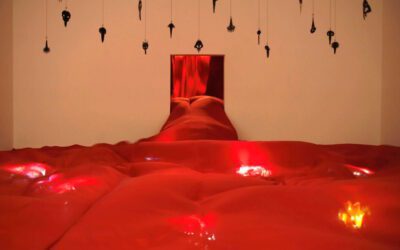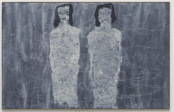Crystal Antlers find liberation in music's current chaos.
Adaptation to the realities of the music market in 2011 is something of a Darwinian exercise. Freetards lurking in the comment feeds of TorrentFreak love the draconian effects of non-consensual music distribution and claim that its effects on contemporary music will be nothing but healthy. Let the fatcats at the major labels line up on the ledges of their penthouse offices – music will become stronger and more innovative as a result of adapting to the new rules. So the theory goes. What is missing in the analogy is the accompanying facet of Darwinian natural selection – the vast numbers of extinct species whose adaptations didn't happen to correspond with what was needed by the conditions of the time. Two-way Mirror certainly show adaptation, but whether their restructuring of the rock song proves to be the adaptation that ensures their survival or hastens their demise, is up to time to decide.
There are the echoes of earlier rock innovators haunting the Two-Way Mirror sound. The ¾-time swing of 'Séance' and 'Knee Deep' evoke Jane's Addiction, whereas the frequent use of lead guitar as a melodic commentary to the vocal owes much to John Fruscianti's work with RHCP. On a first listen, the inevitable comparison is The Strokes – distorted vocals mixed at a lower volume than the other instruments, pummelling drumbeats, acidic guitar voices – there are similarities. Johnny Bell's vocals though, share little of that knowing Casablancas smirk, and he delivers his lines with a raw commitment which is more reminiscent of Bono's live Under a Blood Red Sky performance than anything by The Strokes.
That, given the last couple of decades of U2's descent from bona fide rock crusaders to the staple musical fodder of the paunchy barbecued courgette set, may sound like something of an insult. It is not meant as such – early 80s Bono made up for what he lacked in vocal talent with a primal howl of conviction – Bell shares something of that.
More interesting than the vocal, the high-velocity drumming or the interchange between the broken glass telecaster clanging rhythm guitar and the whining echoes of the lead, are the quirky remakes of the pop/rock format. A trademark technique of the album is the introduction of a secondary verse structure, or it could be a chorus – it doesn't fit well into either category. Recurring, mostly between the first two verses, this secondary sequence often features a doubled tempo, and is often instrumental. It's a little odd, but enlivens the songs and certainly provides an aural hook – even if it does sometimes interrupt the natural flow. That 'natural flow', however, is nothing more than the expectation of ears used to a verse-chorus-verse structure which had more to do with the physical restrictions of seven-inch vinyl discs than it ever did with songwriters.
On 'Summer Solstice' the band let rip with the approach. Starting out with simple keyboard lines over a haunting of guitar feedback/shred, the guitars build into an echoing, bold lead outweighing the vocals. It is short but epic, a difficult combination to pull off. The song uses the aforementioned recurring melodic block – not a verse, not a chorus, but an instrumental passage which changes the secondary tempo and tone. Interesting.
'Way Out' is also worthy of note, with a brooding wobbly keyboard intro; trainlike drumbeat fading in and out of earshot; Hammond organ topnotes, and accordion-like tonal interplay creating an eerie instrumental interlude. It is cinematic, but more B-movie than John Williams. That 1950s 'retrodelia' is evident in 'Fortune Telling' too. Even with its backwards organ chords and guitar wail intro, and its Inspiral Carpets Hammond organ midsection, the track still manages with its final drum/guitar build to evoke T-Birds at the drive-in, milkshakes at the diner, knifefights at the senior prom, etc. Later in the album, the skaggy surf-music of 'Sun-Bleached' as just as evocative. Slightly haunting, with surf guitars and a distant, distorted vocal, the Rhodes organ discords bring a frisson of malevolence to the track. It also features an elegantly wasted moment where the vocalist coughs mid-way through his lines.
By the final track, the abrasive rawness of the band's sound and the innovative aspects of their compositions are well established. 'Dog Days' is a showpiece of both. There is the tempo step-up of the recurring instrumental passage, and the constant melodic drive of a lead guitar which does not wait for its assigned slot in the middle-eight to ring, but instead provides a narrative throughout the song without altering the pace. The singer's voice has an honest commitment to it which is engaging, and it is hard not to feel carried along with the images presented:
If you find a silver lining, don't let it go.
Survival of the fittest or an evolutionary dead-end? Too early to tell, but a bold effort nonetheless.
Crystal Antlers – Two-Way Mirror out on July 11th on Recreation Ltd
Sean Keenan used to write. Now he edits, and gets very annoyed about the word ‘ethereal’. Likely to bite anyone using the form ‘I’m loving….’. Don’t start him on the misuse of three-dot ellipses.
Divides his time between mid-Spain and South-West France, like one of those bucktoothed, fur-clad minor-aristocracy ogresses you see in Hello magazine, only without the naff chandeliers.
Twitter: @seaninspain














